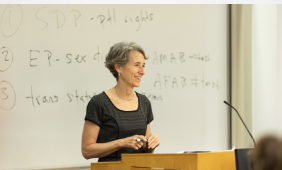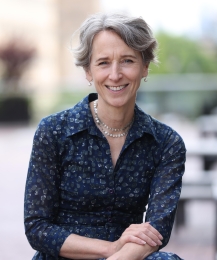Students praise Huntington for her expertise in family law, engaged teaching style, and classroom pedagogy. She will receive the prize, awarded annually by the Law School’s graduating class, and speak at graduation on May 18.
Clare Huntington ’96, Barbara Aronstein Black Professor of Law, was having a relaxed chat in her office with Daniel Abebe, Dean and Lucy G. Moses Professor of Law, when he suddenly said he had something important to tell her. She was worried and “didn’t know what to expect,” says Huntington. But the Dean had only good news for her: The Class of 2025 had selected her to receive the annual Willis L.M. Reese Prize for Excellence in Teaching.
“I was so surprised,” says Huntington, who joined the Columbia Law faculty in 2023. “When I was a student at the Law School, I took classes with six Reese Prize winners—including John Manning, Harvey Goldschmid, and Carol Sanger—and I could not believe I was joining the ranks of my heroes.”
In course evaluations, students say Huntington’s courses can’t be beat. “Her clear, sincere care for our engagement and learning made this class the most conducive environment for learning that I’ve experienced in law school,” wrote one student in her Family Law class. Others describe her as “phenomenal” and “a literal gem,” emphasizing that Huntington is an “inviting teacher” who “truly cares about each student” and encourages them to meet with her outside the classroom.
Huntington’s students especially appreciate her finely tuned pedagogy, which includes having students respond in pairs to cold calls, banning laptops so students cannot be distracted by the internet, and assigning a fiction or nonfiction book that addresses the course’s subject matter. “I have never had another professor who was able to elicit participation from so many people in class, and participating didn’t feel stressful,” wrote one student. Another wrote, “It is clear she values comprehension on a deep level and is willing to take the time to make sure that the members of her class truly understand the content.”
Huntington also brings her scholarship into the classroom. A nationally recognized expert in family and poverty law, Huntington writes about the legal system’s approach to relationships, focusing on early childhood development, the challenges facing nonmarital families, and the effect of technology on relationships. Her most recent work, “Fatherhood, Family Law, and the Crisis of Boys and Men,” was co-authored with June Carbone and published in the Columbia Law Review.
The Path to Professorship
After graduating from Oberlin College with a B.A. in English and development studies, Huntington did not go directly to law school but worked as a caseworker in a foster care agency in New York City. Later, as a student at Columbia Law, Huntington found a role model in Sanger (now Barbara Aronstein Black Professor Emerita of Law), a renowned authority on family, gender, and sexuality law.
“Carol inspired me to become a family law scholar and teacher,” says Huntington, who admired Sanger’s approach to the subject, which emphasized many aspects of relationships. “In family law, you talk about issues like sex and marriage and who does the dishes and how that predicts whether you’re going to get divorced.” Huntington says she follows Sanger’s example of putting family law in a larger context, because, says Huntington, “Family law raises foundational questions about the role of the law in regulating society.”
Huntington did not know that she wanted a career in legal academia when she graduated from the Law School. She spent the first three years of her legal career clerking, first for the U.S. District Court for the Southern District of New York, then the U.S. Court of Appeals for the D.C. Circuit, and finally for Supreme Court Justices Harry A. Blackmun and Stephen G. Breyer. She then spent four years as an attorney-advisor in the Office of Legal Counsel in the U.S. Department of Justice. Eight years after earning a J.D., Huntington launched her academic career in 2004 at the University of Colorado Law School, where she also founded and coordinated the Juvenile and Family Law Program.
A Passion for Pedagogy
Huntington—whose mother was a high school English teacher and principal and whose father taught at a law school for several years—has a passion for teaching. “I am interested in the way people learn, so I read a lot of studies about effective pedagogy,” she says, explaining that people learn visually, by reading or listening, and by doing. “I tell my students that I’m going to use these different methods. I explain that I am a visual person, so I do a lot of drawing on the board. But I tell them that if my pictures don’t make sense, ignore them, because this approach to learning may not be effective for some people. For some students, however, the drawings make concepts click, with some students saying they finally understood the differences in tiers of scrutiny because of the overlapping circles I drew on the board.”
Students praise Huntington’s methods for engaging them, such as giving the class a hypothetical and dividing them into three groups—plaintiff’s attorneys, defense attorneys, and judges—and making them come up with mock arguments in a spontaneous collaboration. “That’s what being a lawyer is often like: working with colleagues under time pressure,” Huntington says. In Family Law, she devotes two full classes to a divorce negotiation simulation, which students say is an effective way to combine theory and practice.
Huntington also teaches Legislation and Regulation, Poverty law, and a course she designed: Lawyering in an Age of Political Polarization. “Family law is one of the areas where we are polarized on issues such as abortion and gender-affirming care, but there are also red-blue patterns that are surprising,” she says. “I want students to think about how lawyers can work across differences and, in ourselves, inculcate greater epistemic humility and a sense of fallibility, not from a place of insecurity but from a place of curiosity. That’s the kind of mentality I’m trying to foster in the classroom.”
Her approach to teaching resonates with students. Perhaps the highest accolade of all came from a student who simply wrote, “I loved coming to class.”





